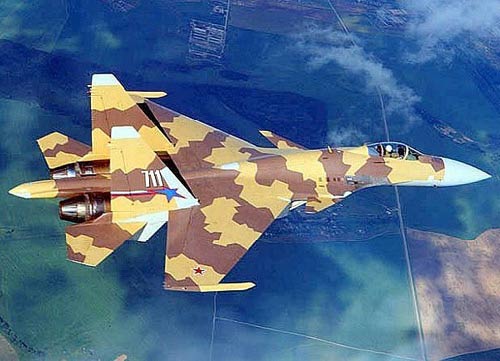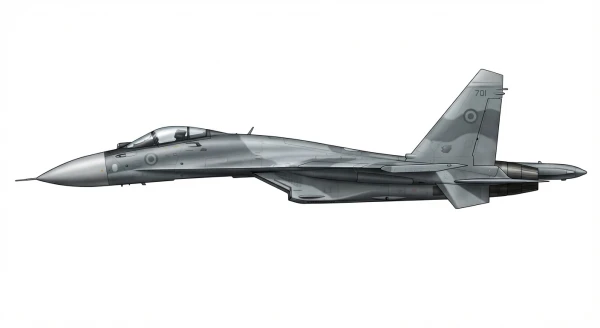Su-37 Super Flanker
Summary
| Category | Combat Aircraft |
| Origin country | 🇷🇺 Russia |
| Manufacturer | Sukhoi |
| First flight | 12 April 1996 |
| Year introduced | 1997 |
| Number produced | 1 units |
| Average unit price | $70 million |
Description
The Su-37 is the latest aircraft in the Su-27 Flanker family. During its initial public demonstrations, it performed flight maneuvers that had never been seen before. The Su-37 exhibits exceptional maneuverability, thanks not only to the intrinsic qualities of the Flanker, but also to its thrust vectoring engines, which can be tilted vertically from +15 to -15 degrees.
Its fuselage is largely made of composite materials such as carbon fiber. Mobile canard wings, which were not present on the Su-27, have been introduced. The avionics of the Su-37 are highly sophisticated. Its NIIP N011M radar is capable of simultaneously tracking both air and ground targets, and it has rear scanning capabilities. The cockpit is very modern, featuring 4 multifunction displays.
The main challenges encountered during the development of this aircraft were financial in nature. The program was temporarily halted due to a lack of government funding, but resumed in 1999 with the return of subsidies. However, it is unlikely that the Russian Air Force will be able to procure the Su-37. Sukhoi is therefore focusing on export opportunities.
Technical specifications
| Version: Su-37 Super Flanker | |
|---|---|
| Crew | 1 pilot |
| Maximum speed | 2494 km/h (1550 mph) |
| Wing area | 62 m² (667.4 sqft) |
| Wingspan | 14.7 m (48.2 ft) |
| Height | 6.4 m (21.1 ft) |
| Length | 22.2 m (72.8 ft) |
| Service ceiling | 18,000 m (59,055 ft) |
| Empty weight | 18,500 kg (40,785 lbs) |
| Max. takeoff weight | 35,000 kg (77,162 lbs) |
| Powerplant | 2 x turbofans AL-37FU delivering 7598 kgf each |
| Ejection seat | Zvezda K-36DM |
Current operating countries
All operators

